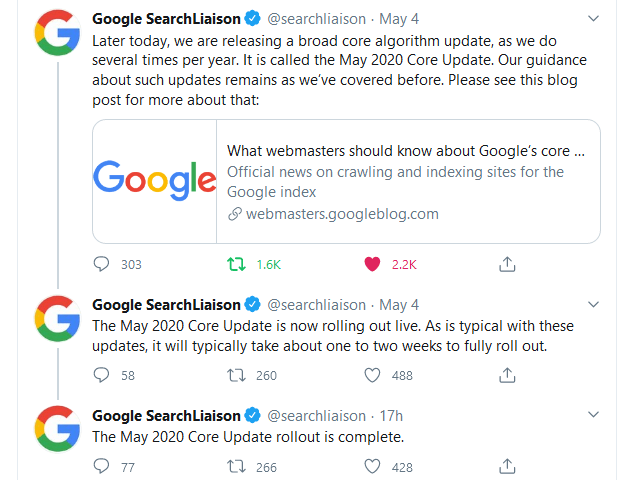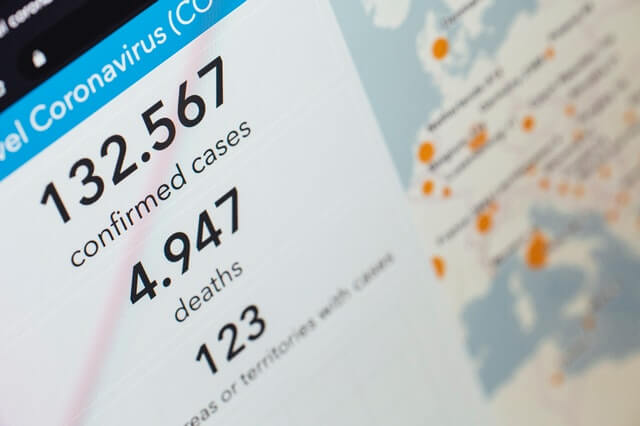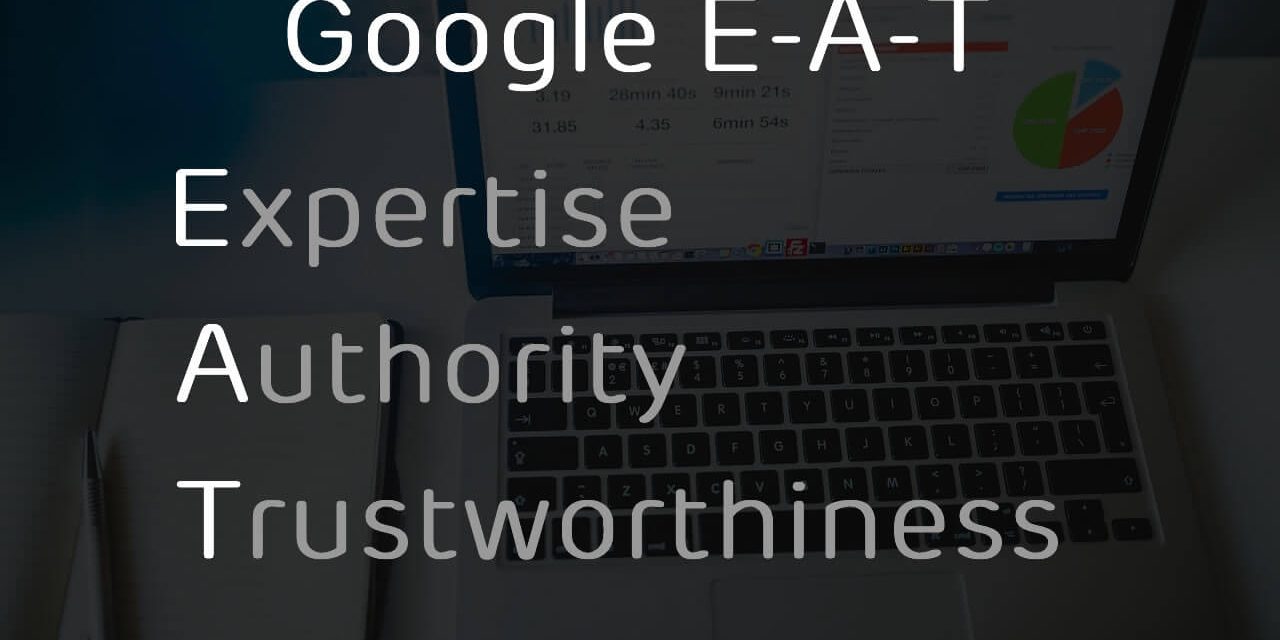Google makes small changes to the way the algorithm orders search results daily. Most of these are small adjustments based on feedback from human Search Quality Raters, users, website owners and Google staff. They are always designed to improve the user experience, relevance of search results and fairness.
In an ideal world this should mean that websites with excellent, useful content will gradually rise to the top.
Individual website owners may notice their Google rankings fluctuate but these are down to both algorithm changes and the changes in competitor websites. The order of the search results can often change, sometimes by the hour!
Core updates to Google
While Google doesn’t do a running commentary on minor changes, it does go public with major changes which it calls ‘Core Updates’.
The Google search liaison Twitter feed is worth following for any issues so you can pre-empt any major changes to search.
It did go public with this particular core update and the most recent was announced and completed on May 4 2020.
What we think about the May 2020 core update
We haven’t noticed any major fluctuations with our own and client search engine rankings and Google’s main comment was linking to last years’ Google webmasters blog post on the previous core update (What webmasters should know about Google’s core updates).
This focused on the principles of E-A-T (expertise, authority and trustworthiness) plus quality of content.
This is probably a reflection of the strange times we are living in. As the Covid-19 pandemic progresses there is an ever greater need for people to be informed and not misinformed. Unchecked, the Internet can allow the spread of ignorance through simple web searches.
If someone is searching for, say, symptoms for Covid-19 they need to be linked to the most authoritative websites so they get the right information. They should not be linked to the latest unproven crank cures or some dubious blogger with bizarre theories about epidemiology.
This is similar territory to queries about the holocaust, where a query like ‘Did the holocaust happen’ once used to link to far right holocaust denial websites. Google intervened after crusading work by Guardian journalist Carole Cadwallader and demoted or removed the misinformation from search results.
This does not shut down debate or stifle the alternative views, but it definitely gives less prominence to the crazies!
The same algorithm that works so well for finding a good floor sanding company or taxi company can sometimes lead to misleading results and boost the unscrupulous.
What to do about the May 2020 core update
The main conclusion we can draw from this update is that Google is trying to ensure that quality websites are boosted in search results. They are quite open about their Quality Raters and the document they refer to is here: Google Search Quality Guidance document
This means boosting website that can answer positively for some or all of the following:
Content and quality questions
- Does the content provide original information, reporting, research or analysis?
- Does the content provide a substantial, complete or comprehensive description of the topic?
- Does the content provide insightful analysis or interesting information that is beyond obvious?
- If the content draws on other sources, does it avoid simply copying or rewriting those sources and instead provide substantial additional value and originality?
- Does the headline and/or page title provide a descriptive, helpful summary of the content?
- Does the headline and/or page title avoid being exaggerating or shocking in nature?
- Is this the sort of page you’d want to bookmark, share with a friend, or recommend?
- Would you expect to see this content in or referenced by a printed magazine, encyclopaedia or book?
Expertise questions
- Does the content present information in a way that makes you want to trust it, such as clear sourcing, evidence of the expertise involved, background about the author or the site that publishes it, such as through links to an author page or a site’s About page?
- If you researched the site producing the content, would you come away with an impression that it is well-trusted or widely-recognized as an authority on its topic?
- Is this content written by an expert or enthusiast who demonstrably knows the topic well?
- Is the content free from easily-verified factual errors?
- Would you feel comfortable trusting this content for issues relating to your money or your life?
Presentation and production questions
- Is the content free from spelling or stylistic issues?
- Was the content produced well, or does it appear sloppy or hastily produced?
- Is the content mass-produced by or outsourced to a large number of creators, or spread across a large network of sites, so that individual pages or sites don’t get as much attention or care?
- Does the content have an excessive amount of ads that distract from or interfere with the main content?
- Does content display well for mobile devices when viewed on them?
Comparative questions
- Does the content provide substantial value when compared to other pages in search results?
- Does the content seem to be serving the genuine interests of visitors to the site or does it seem to exist solely by someone attempting to guess what might rank well in search engines?
As ever, Google wants website owners and webmasters to focus on good user experience, quality and accuracy of information.
Get in touch with Dinesh on 07941 686113 if you need help on web design, web hosting, SEO services, domain names or email marketing.
Find Google’s Search Quality Rating guidance here: Google Search Quality Guidance document





